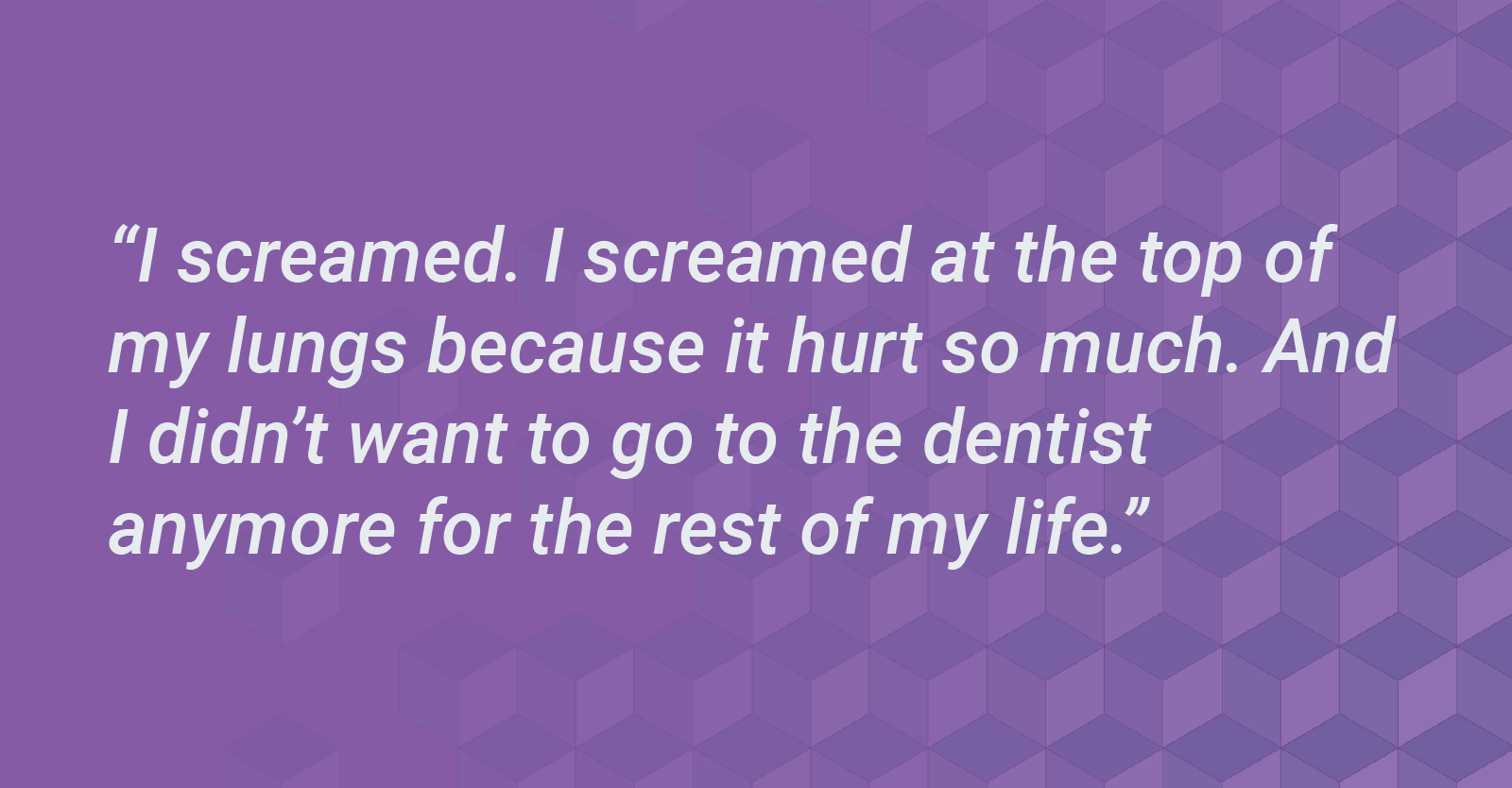
In the dental office, one experience, good or bad, can have a lasting impact. For too many people, negative experiences add up over time, travel through the grapevine, and lead to anxiety, fear, and shame that put up walls between entire communities and the care they deserve.
And as is the case for so many social determinants of health, race and racism are inextricably intertwined.
“We lived on the wrong side of the tracks being African American. There was only one dentist that I remember who was even available to us. I didn’t know what a dentist was. I didn’t know what a dentist did,” Carol said. “To the best of my memory, which was many years ago—in the mind of a child—I just remember his pulling on something in my mouth. Pulling back and forth with what looked like a pair of pliers. I screamed, I screamed at the top of my lungs because it hurt so much. And I didn’t want to go to the dentist anymore for the rest of my life.”
Carol’s Story
Carol had a traumatic experience in a dental office early in life that led to an unimaginable amount of pain. Pain that continued throughout childhood, perpetuated by a fear of returning to the dentist when cavities or other issues arose.
“Whenever I would have a toothache, I wouldn’t tell my mom. And if I had a cavity, I couldn’t sleep at night. I couldn’t rest well. It impacted my chewing, my swallowing, and my overall health because I would have pain in my ears and down the side of my neck,” she said. “But I was so scared. I was scared to experience the pain at the dentist again.”
In her community, Carol wasn’t the only one with a fear of the dental office.
“Stories travel. Stories travel really quickly. And bad stories travel much faster than the good ones. So not only did we know to be afraid of the dentist — and of course he was white, and we were all Black — not only to be afraid of this white man with this chair and this stuff in his office, but also that he hurt children, and he hurt adults. It really kept people from wanting to get the help they needed because of the physical pain.”
A Barrier to Access
Carol story isn’t a relic of the past. The same kind of fear she experienced as a child grips others today, and anxiety, fear, and shame around dental care is still a serious barrier preventing access.
“What I can tell you unfortunately is that there are many stories that are similar to mine in today’s time. That is true for dental care, and it is true across the board,” said Carol. “One, people are already afraid. Two, people don’t have to treat you well. This thing with Black Lives Matter, it’s not new. This thing with institutional and structural racism, it’s not new.”
But just as much as negative experiences can leave traumatic imprints, positive experiences can change entire outlooks on oral health care.
Carol said, “When I started going to the dentist here (in North Carolina), he had a sign in his office that said, ‘we cater to cowards.’ I said, ‘good, because that’s me!’ I told him about my experience, and he said, ‘you won’t experience anything like that here.’ His mannerisms were engaging, he would come into the room smiling and ask me what I had been up to. We would talk, and it was a whole different atmosphere. I started going twice a year, using my preventive care.”
Dentists can play an important role in helping those who are experiencing anxiety, fear, and shame, just by taking the time to understand the range of experiences that their patients may bring into the dental office.
A Willingness to Listen and Learn
“I think it’s really important for dentists to make sure they are getting outside of their comfort zone and their group, even if it’s a professional setting, to talk about things like structural racism,” said Carol. “It’s important to get into groups with folks like myself where we can talk openly and share stories and they can ask questions. And also, if they have patients who come in, just being willing to learn, being willing to listen, and being willing to talk.”
“Provide that openness, because when a person has been privileged, they really don’t know,” she said. “An example is in my family, education is a big deal. Everybody in my family did public speaking. So, when it was my turn and I was two or three I just jumped up and I did it too, because that’s what we do. I say that as an example of the fact that I didn’t know that I was supposed to be afraid of public speaking. I have been fortunate for something to be natural to me that may not be natural to most people. So just because someone has white privilege does not mean that there aren’t opportunities to learn. There are opportunities to learn.”
An Opportunity for Change
At NCOHC, we work to ensure that everyone — no matter their background, where they live, or who they are — has access to quality, affordable oral health care. We thought that Carol’s story was an important one to tell to highlight just how serious anxiety, fear, and shame as social determinants of health can be.
Is her story an indictment of dentists? No. But is it something we believe all dentists could learn from? Absolutely. The humility to step outside of your comfort zone and experience someone else’s truth can be difficult, but it can also help providers change patients’ lives.


